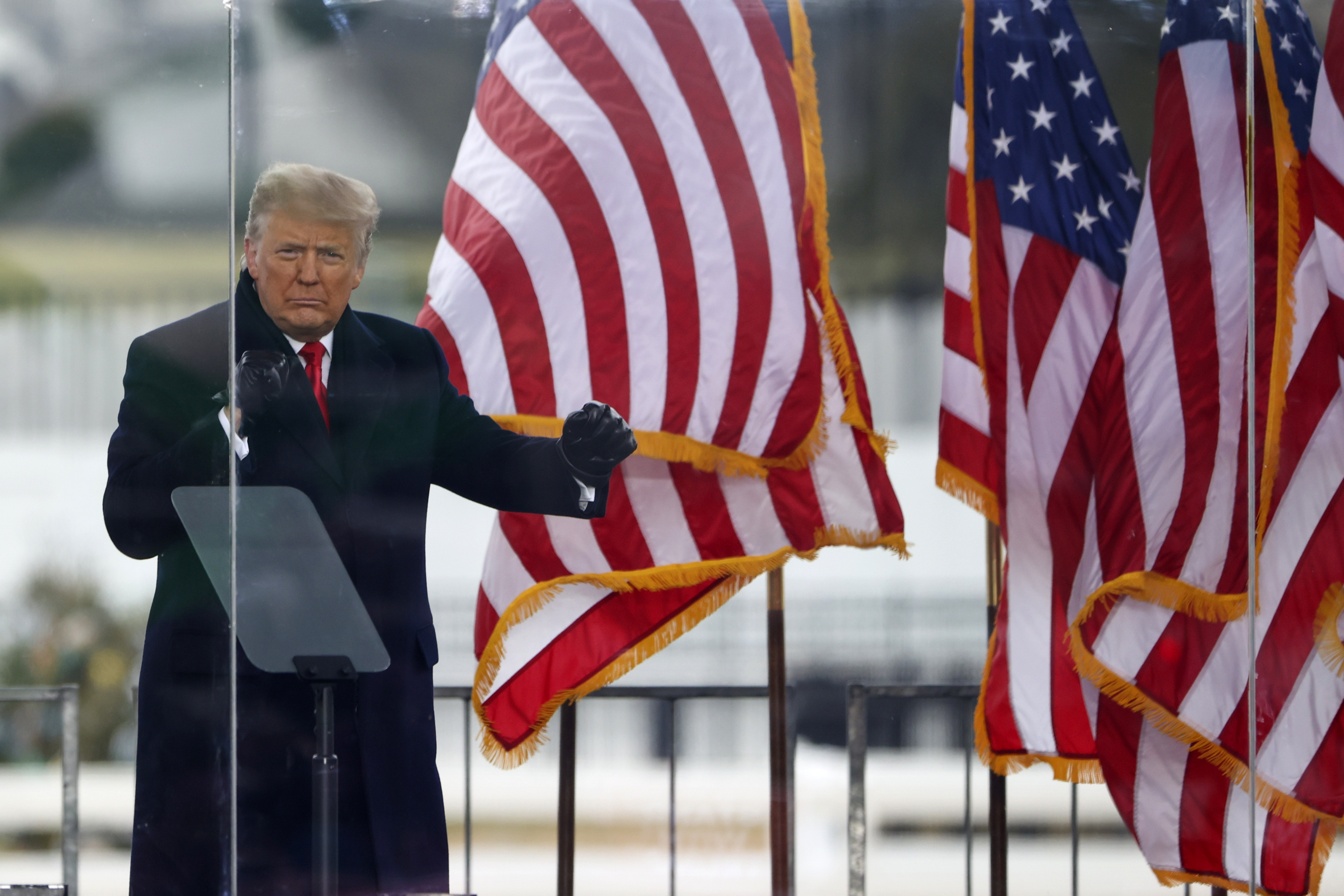Starting the steal?
Election-integrity watchdogs are sounding the alarm as Trump allies take control of swing states’ election machinery.

A free daily email with the biggest news stories of the day – and the best features from TheWeek.com
You are now subscribed
Your newsletter sign-up was successful
Election-integrity watchdogs are sounding the alarm as Trump allies take control of swing states' election machinery. Here's everything you need to know.
What is the concern?
Acolytes of Donald Trump, galvanized by his false claims of voter fraud, are laying the groundwork for overturning future elections by commandeering state and county election systems. A major reason Trump failed in his efforts to overturn the 2020 election is that state and local election officials, many of them Republicans, certified the results over Trump's objections and threats. In response, Trump allies such as far-right nativist Steve Bannon have launched a campaign to replace principled officials with Trump allies, from the lowest county volunteer up to states' top election officials. Next time, the battered guardrails that held firm in 2020 might be gone, said Wendy Weiser of the Brennan Center for Justice. "This is a giant crisis," she said. "We've never seen anything like that before."
The Week
Escape your echo chamber. Get the facts behind the news, plus analysis from multiple perspectives.

Sign up for The Week's Free Newsletters
From our morning news briefing to a weekly Good News Newsletter, get the best of The Week delivered directly to your inbox.
From our morning news briefing to a weekly Good News Newsletter, get the best of The Week delivered directly to your inbox.
How are Trump's allies doing this?
The most visible effort is being made by scores of Stop the Stealers who are running to be secretaries of state — in most states, the top election official. An NPR analysis counts at least 20 current Republican secretary of state candidates who question the legitimacy of the 2020 election, running in 17 states. In Georgia, Secretary of State Brad Raffensperger, who famously resisted Trump's entreaties to "find" 11,780 Trump votes, is being challenged by Jody Hice, a Trump-endorsed congressman who opposed certifying the 2020 vote. In Michigan, among those running in the Republican primary is Kristina Karamo, a community college professor who has called the Jan. 6 uprising a "false flag" operation by leftists and says Democrats are following "a Satanist agenda." Running in Arizona is Mark Finchem, a member of the Oath Keepers militia who was present at the Capitol insurrection and has links to QAnon. "There's a lot of crazy going around," said Trey Grayson, a Republican former secretary of state in Kentucky. "You have people running for these offices where the most important duty is counting the votes and accepting the results even if you don't like the outcome, and these folks don't appear to be well-positioned to do that." There are also efforts to replace lower-level elections officials.
Where is that happening?
Across numerous battleground states, at every level. In Michigan, the state Republican Party replaced Aaron Van Langevelde, a member of the state board of canvassers who cast a decisive vote to certify the state's election results in favor of Biden. In eight of the state's largest counties, Republicans have replaced members of the boards of canvassers — who certify results — with Trump partisans. "They're laying the groundwork for a slow-motion insurrection," said local Democratic election lawyer Mark Brewer. In Horry County, South Carolina, a longtime Republican election official, Mike Connett, lost his position after an unprecedented crush of citizens showed up for a county convention and elected a QAnon supporter. In Pennsylvania, hundreds of Trump supporters recruited by Stop the Steal groups won county election inspector positions in November, some through write-in campaigns. There and in many other states, Trump-linked newcomers are filling positions vacated by veteran officials who are walking away after being inundated with threats and harassment. Officials in many counties say they've been deluged with Trump loyalists volunteering to serve as precinct officers, many of them rallied by Bannon. In some states, proposed new laws might help them contest or overturn any results they don't like.
A free daily email with the biggest news stories of the day – and the best features from TheWeek.com
What would those laws do?
They'd give state legislatures unprecedented power to exert control over local election boards and the certification of results. At least 148 such bills were introduced in 36 states last year, according to a report by three nonpartisan watchdog groups called "A Democracy Crisis in the Making." Bills were proposed in seven states, including Arizona, Missouri, and Nevada, that would have given legislatures the power to change or overturn election results. "We are at code red," said Jena Griswold, Colorado's Democratic secretary of state. "We are seeing a coordinated effort by extreme Republicans to undo American democracy." Much of this legislation has not yet passed, but three states have enacted laws giving partisan legislators pathways to control county election administration. They include Georgia, which passed a sweeping election bill last March. It allows a state board appointed by the Republican legislature to take control of county vote tallying, and to replace a local board with a handpicked administrator who could invalidate ballots.
What can be done?
Election-integrity experts say federal legislation is needed that would restrict a state legislature's ability to insert itself into election administration or vote certification — but Senate Republicans oppose federal rules over how states run elections. That leaves one realistic strategy for those opposed to the MAGA organizing campaign: a counter-movement of principled Republicans and Democrats to prevent a Trumpist takeover of election machinery. Bannon, meanwhile, crows that Trump populists are making great inroads. "It's about winning elections with the right people — MAGA people," he said. "We will have our people in at every level."
Bannon's volunteer army
For Rick Barnes, the Republican Party chair in Texas' Tarrant County, the barrage of calls was baffling. People were suddenly clamoring to know how they could become volunteer precinct officers, a low-level role that's never drawn much interest. The reason, Barnes soon learned, was Steve Bannon. On his popular War Room podcast, the former Trump adviser had issued a "call to action," beseeching Trump supporters to volunteer at local election boards — part of a "precinct strategy," aimed at taking the reins of election administration "village by village." Bannon's effort has yielded big dividends. When ProPublica reached out to Republican leaders in 65 counties, 41 reported an unprecedented surge in volunteers, one unmatched on the Democratic side. "People are coming out of the woodwork," said Polk County, Florida, party chair J.C. Martin. Their motivation is simple, said Palm Beach County GOP chair Michael Barnett, who's seen a similar surge. They feel Trump was defrauded of his rightful win, and that "their involvement in upcoming elections will prevent something like that from happening again."
This article was first published in the latest issue of The Week magazine. If you want to read more like it, you can try six risk-free issues of the magazine here.
-
 6 exquisite homes with vast acreage
6 exquisite homes with vast acreageFeature Featuring an off-the-grid contemporary home in New Mexico and lakefront farmhouse in Massachusetts
-
 Film reviews: ‘Wuthering Heights,’ ‘Good Luck, Have Fun, Don’t Die,’ and ‘Sirat’
Film reviews: ‘Wuthering Heights,’ ‘Good Luck, Have Fun, Don’t Die,’ and ‘Sirat’Feature An inconvenient love torments a would-be couple, a gonzo time traveler seeks to save humanity from AI, and a father’s desperate search goes deeply sideways
-
 Political cartoons for February 16
Political cartoons for February 16Cartoons Monday’s political cartoons include President's Day, a valentine from the Epstein files, and more
-
 Japan’s Takaichi cements power with snap election win
Japan’s Takaichi cements power with snap election winSpeed Read President Donald Trump congratulated the conservative prime minister
-
 How realistic is the Democratic plan to retake the Senate this year?
How realistic is the Democratic plan to retake the Senate this year?TODAY’S BIG QUESTION Schumer is growing bullish on his party’s odds in November — is it typical partisan optimism, or something more?
-
 The billionaires’ wealth tax: a catastrophe for California?
The billionaires’ wealth tax: a catastrophe for California?Talking Point Peter Thiel and Larry Page preparing to change state residency
-
 Bari Weiss’ ‘60 Minutes’ scandal is about more than one report
Bari Weiss’ ‘60 Minutes’ scandal is about more than one reportIN THE SPOTLIGHT By blocking an approved segment on a controversial prison holding US deportees in El Salvador, the editor-in-chief of CBS News has become the main story
-
 Has Zohran Mamdani shown the Democrats how to win again?
Has Zohran Mamdani shown the Democrats how to win again?Today’s Big Question New York City mayoral election touted as victory for left-wing populists but moderate centrist wins elsewhere present more complex path for Democratic Party
-
 Dutch center-left rises in election as far-right falls
Dutch center-left rises in election as far-right fallsSpeed Read The country’s other parties have ruled against forming a coalition
-
 Millions turn out for anti-Trump ‘No Kings’ rallies
Millions turn out for anti-Trump ‘No Kings’ ralliesSpeed Read An estimated 7 million people participated, 2 million more than at the first ‘No Kings’ protest in June
-
 Has the Gaza deal saved Netanyahu?
Has the Gaza deal saved Netanyahu?Today's Big Question With elections looming, Israel’s longest serving PM will ‘try to carry out political alchemy, converting the deal into political gold’